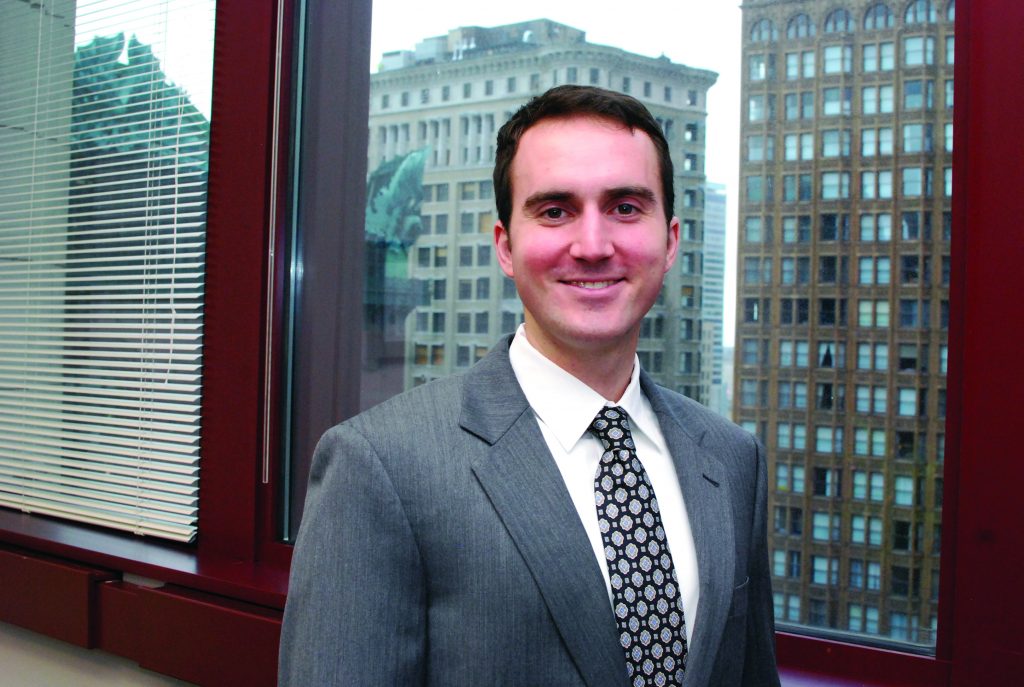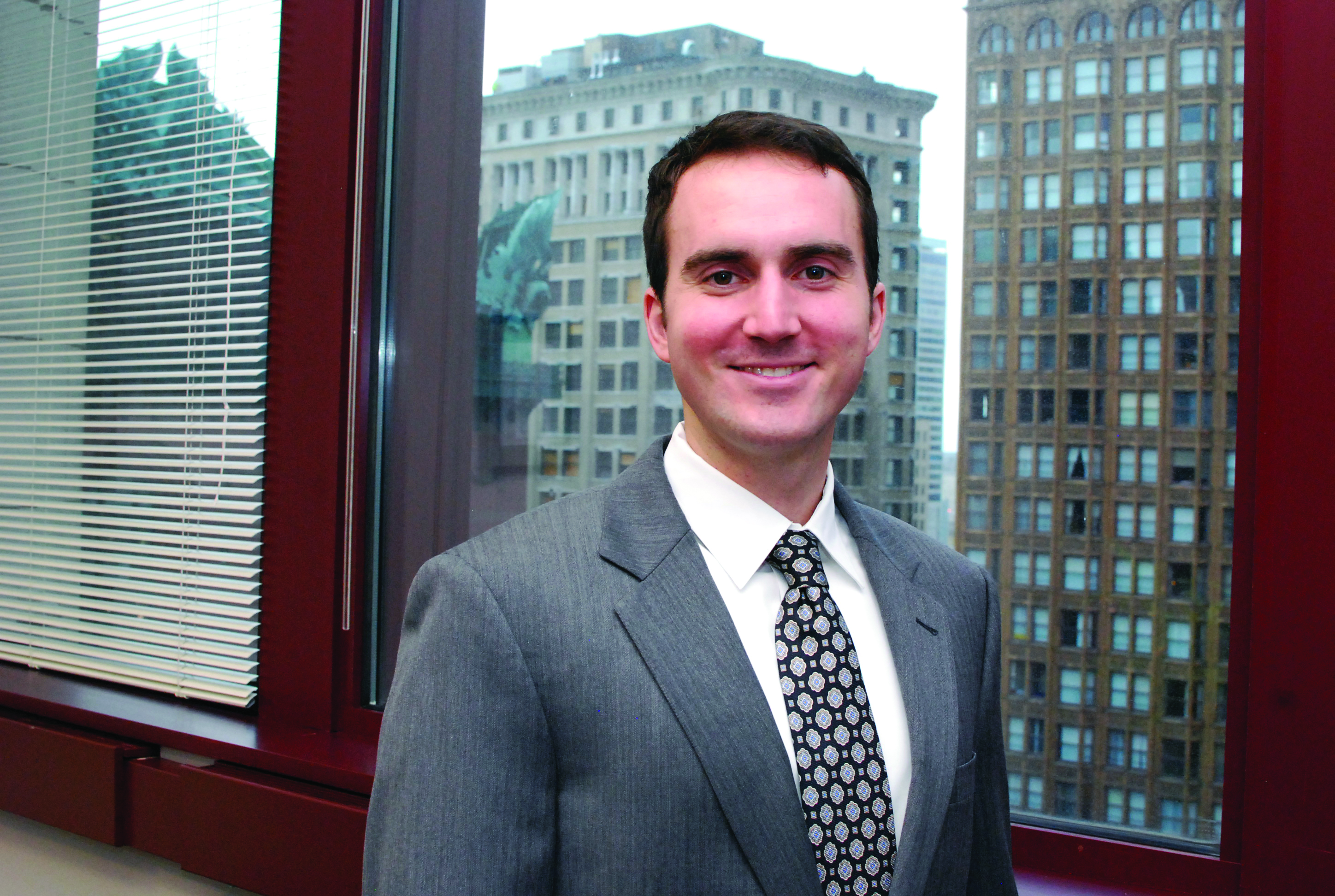
Timothy Fox (MS ’14), an analytics consultant, says his MS in Economics and Policy Analysis degree has helped him to “harness the problem-solving horsepower of economics.”
Four years ago forecasters predicted the market for big data analytics would grow to $16 billion by 2015. Their prediction was correct, but the growth rate was not. Now the projected growth is $125 billion.
This jet-fueled growth in the data analytics market is creating an epic job shortage to the tune of 140,000 to 190,000 a year, according to one study.
This is an alarming challenge considering that researchers estimate American businesses lose $600 billion annually because of “dirty data.” Too few people are being trained to extract, analyze and communicate big data sets. But DePaul business alumni are discovering a successful path into this hot job market from an unlikely place—the Department of Economics.
Alumni Praise Program’s Effectiveness
Data was once the domain of computer techs who wrote sophisticated mathematical formulas to turn behavior into numbers. Now, with industries collecting data on hundreds of millions of people, businesses are desperate to take those huge numerical data sets and turn them into revenue. Organizations use data to decide everything from whether to sell chocolate-covered cherries in New England in March or to ship their retail kayaks from China or Reno, Nev.
At this crossroads of quantifying human behavior and qualitative analysis, the economics discipline is emerging on the big data analytics landscape. DePaul University business alumni say the university’s Master of Science in Economics and Policy Analysis degree program provides critical courses that are helping them succeed in their current predictive analytics jobs. With classes in econometrics, research methodologies, data inspection, advanced statistical modeling and forecasting, the program teaches the necessary skills to decipher data, giving alumni advantages over peers in the industry.
“What I learned from the program is how to solve problems,” says Matt Frankland (BA ’08, MS ’11), a forecast analyst at REI Merchandising in Seattle. He uses data analysis to help his managers make kayak-shipping decisions. Frankland was one of the first graduates of the program, and he previously worked as a data analyst at Walgreens in Chicago.
“DePaul’s program taught us how to set up a problem, and how to solve it with the information we have,” Frankland says. “With large data sets many people suffer from analysis paralysis. You have so much in front of you, it’s difficult to know where to stop. But at DePaul we learned to focus on the key metrics: What problem am I trying to solve? What do I need to solve that problem? And how do I get there?”
Program Teaches Skills Used Daily
Tim Fox (MS ’14), an advanced analytics consultant at Chicago-based West Monroe Partners LLC, says at his job it’s rare that analysts receive a nice, clean data set to explore. Most of the time, data is buried among different sources, and analysts have to collect, clean up and prepare data before even beginning to analyze it.
The MS in Economics requires students to learn and use Stata, a data analysis and statistical software tool used by industry leaders. In addition, students become well versed in pairing data analytics software with familiar office tools such as Microsoft Excel. The result, Fox says, is that the program makes graduates adept at not only analyzing data, but also communicating what is discovered into actionable items.
“DePaul’s program allows you to be flexible with how to learn economics, as well as providing opportunities to take additional math and statistics classes so that you learn the different skill sets that are required to really harness the problem-solving horsepower of economics,” says Fox.
Economics Degree Offers Great Job Prospects
Forbes.com recently called the MS in Economics one of the top 10 degrees for today’s job market. DePaul’s MS in Economics is unique because it goes beyond the scope of focusing on government and business allocation of resources to include a rigorous analytics component that offers students practical statistical and data analysis skills used by myriad industries and fields.
“We knew that there were jobs waiting for students who had the right blend of a deep understanding of economic theory and the ability to apply that knowledge to real-world situations,” says Thomas Donley, chair of the Department of Economics at the Driehaus College of Business. “That’s why this degree was created.”
Both Fox and Frankland say completion of the program allowed them to flourish in their careers and also blossom in life.
Frankland laughs as he remembers the 19-year-old version of himself wondering the halls of DePaul trying to figure out what to do with his life. A local skateboard celebrity in Chicago, his future was as uncertain as his next gig. After taking economics courses, a path began to unfold. He credits DePaul’s professors with taking a chance on him and pushing him to achieve for his current success.
“They told me you have a lot of potential and you could be really good at this if you worked hard,” Frankland said. “DePaul has the most wonderful professors in the economics department. I owe them so much. They care so much about getting you through the program and making sure you work hard and that you find what you want to do when you’re done. If I had not ended up within the economics department, I wouldn’t be where I am today.”
By Ovetta Sampson
